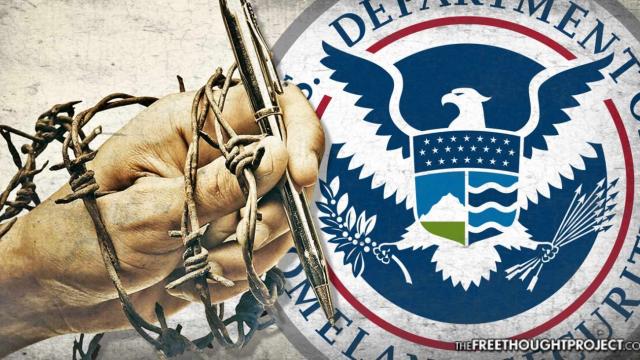
The Department of Homeland Security intends to list and track hundreds of thousands of news outlets, journalists, bloggers, and "influencers" in traditional and new media alike. Its plan is to analyze targets' "sentiment," monitor "any and all" coverage of select news stories, and possibly share data with "federal, state, local, tribal, and private partners."
If you find yourself skeptical of this proposal of mass state monitoring of the press, consider yourself a bonafide member of the "tinfoil hat wearing, black helicopter conspiracy theorists," DHS representative Tyler Houlton said Friday. It's all very routine, he argued, casting the project as an innocent means of "monitoring current events." Just shut up and let us do this, crackpots.
Yet I am bareheaded, untroubled by black whirlybirds, and utterly unconvinced.
Consider the practical incongruities. While a database of the sort DHS wants could be used to follow news stories, it isn't necessary for the job. From basic Google News alerts to subscription services with more robust analytic functionality, news tracking programs already exist. Likewise, if DHS needs "to build media lists based on beat, location, outlet type/size, and journalist role," as its specs document says, an existent public relations service would easily do the trick. The Department of Homeland Security in the Year of Our Lord 2018 is not the first entity to realize this information might be valuable to collect and analyze for more successful press release distribution.
DHS is surely aware media services are available, which raises the question of why it did not elect to use one. If the aim here, as Houlton claims, is "nothing more than the standard practice of monitoring" the news, why not use the standard programs to do it?
The distinction seems to be twofold. First, the DHS database is noticeably personal. It is not content with assessing the general mood on a given news story, or even the editorial stance of an entire outlet. No, the database will list individuals — "journalists, editors, correspondents, social media influencers, bloggers etc." — including not only their contact information, employment, and beat, but "any other information that could be relevant." Any other information. Is it so surprising this plan is anxiety-provoking for those of us who could conceivably be listed?
The second distinction is this is a government list — DHS evidently wants a proprietary database, not the rent-a-list services it could obtain more quickly and cheaply — and government lists do not have a stellar reputation. The terrorist watchlist is exemplary on this point, and reviewing its record of abuse and incompetence takes us nowhere tinfoil territory.
Officially known as the Terrorist Screening Database, the watchlist includes the no-fly list and 10 other lists and screening programs in the Departments of Justice, Defense, Treasury, and Homeland Security. It is a sprawling data monster best known for its failures, and it has exploded from fewer than 50,000 entries at the close of the Bush administration to more than 1.8 million people today. Almost 40 percent of those listed have no demonstrable ties to terrorism, and 99 percent of the names suggested for the list are accepted. Evidence as flimsy asa suspicious social media post is enough for inclusion. The removal process is slow, confusing, and secretive.
This is how you end up with list members like actor Mark Ruffalo, former Sen. Ted Kennedy (D-Mass.), Rep. Tom McClintock (R-Calif.), a 4-year-old boy, a Marine veteran, an Air Force veteran, a "wheelchair-bound Stanford University scholar," acquitted people, and dead people. "The watch lists operate like a ratchet: It is beyond easy for a government official to ‘nominate’ someone for listing, yet exceedingly difficult to be removed," explains law professor Ramzi Kassem at The Washington Post. "And the consequences of such highly arbitrary and potentially abusive government action can be devastating."
It is this list-making expertise DHS now seeks to apply to the press, and the potential for abuse both individual and institutional is enormous. Unethical law enforcement agents have used databases to creep on love interests, exes, and others they find sexually interesting. Now, they can add the press to their stalking pool.
At an institutional level, a supply of big data creates its own demand for state action. If this list is created, DHS will want to do something with it, and that something almost certainly won’t be limited to innocuous fare like sending out press releases and keeping up with current events.
Despite its deeply flawed construction and sloppy maintenance, the terrorist watchlist has been pitched as a means of gun control. What opportunities might present themselves to a press-phobic administration once a media list like this is on hand?
President Trump believes "it is frankly disgusting that the press is able to write whatever it wants to write." What use might he find for a list like this? What use might any future administration with a loose commitment to civil liberties find? How does tracking journalists keep the homeland secure? What good can possibly come of this?














